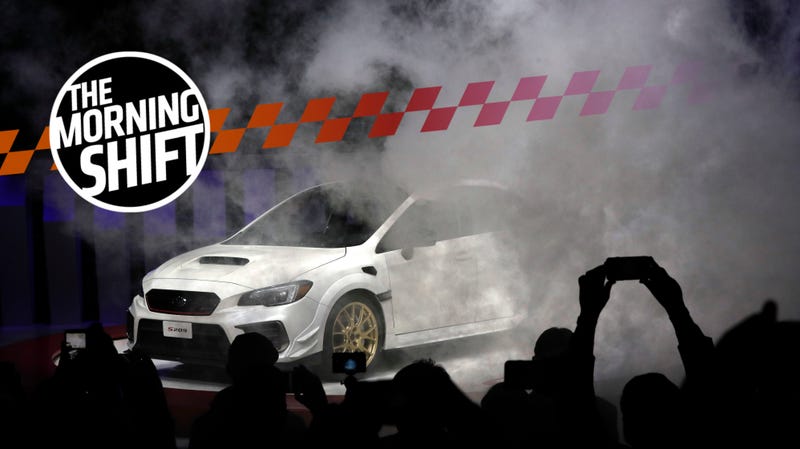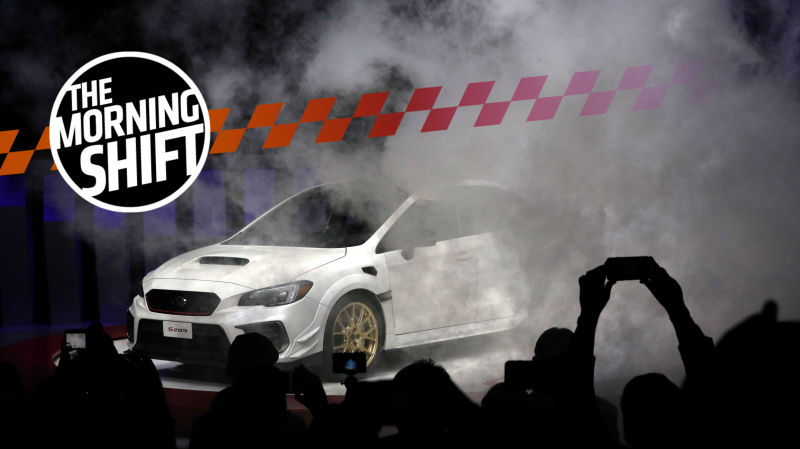
 The Morning ShiftAll your daily car news in one convenient place. Isn’t your time more important?
The Morning ShiftAll your daily car news in one convenient place. Isn’t your time more important? Subaru’s success is draining its resources, Toyota has a pipe-dream autonomous car in the works, and the truck battles are hotter than ever. All this and more in The Morning Shift for Monday, Feb. 11, 2019.
1st Gear: Subaru’s Success Is a Double-Edged Sword
Subaru has been clocking in record sales in the United States for ten years now, and there’s no reason to believe that 2019 will prove any different. But all that success is coming with a price to pay, according to Automotive News:
At the end of last month, responding to public accusations that Subaru perpetuates a pressure-cooker environment, the automaker acknowledged that some facilities in Japan compelled thousands of workers to forgo millions of dollars in unpaid wages by working overtime off the clock.
[…]
A rash of production hitches in Japan has slammed Subaru’s reputation in the home market, torpedoed its Japanese sales and triggered corporate upheaval. The problems are now creeping into the United States in the form of recalls and lost shipments.
“We continue to be concerned that [Subaru] is not making the necessary investments and changes fast enough to ensure that vehicles are being produced with the quality the brand and its customers deserve,” the marque’s U.S. National Retail Advisory Board wrote in a Sept. 18 resolution to top Subaru management in the U.S. and Japan after last year’s rollout of the U.S.-built Ascent crossover was marred by a recall.
The huge demand for Subarus—and with the next-generation Outback set to make its comeback—is outpacing the supply. Quality control is lacking, production has been halted, workers are quitting, and those that don’t are forced to work ridiculous amounts of overtime—105 hours in a month, in one case
Subaru CFO Toshiaki Okada has stated that the company should have “increased our capacity accordingly in terms of management and facilities” to match the growing demand, but didn’t do so.Now, Subaru is searching for ways to “carefully” start expanding in the midst of crisis.
2nd Gear: Toyota Will Sell a Self-Driving Car in One Year
At least, that’s what the company is currently proposing.
Toyota, Japan’s largest auto manufacturer has a a lot planned but also a lot of work to do to get there, according to a report byAutomotive News Europe. The idea is just the first step.
[Toyota] must develop hardware and software for the vehicle, dramatically slash the cost of the technology and ramp up the hiring of the software engineers who will make it all happen.
That’s the challenge facing James Kuffner, CEO of Toyota Research Institute Advanced Development Inc., or TRI-AD. His Tokyo company was set up in March to spearhead Toyota’s attempt to bridge the gap between research and the showroom floor.
The first milestone comes in 2020, when Toyota plans to introduce vehicles capable of driving themselves on highways. Kuffner said they would be rolling supercomputers.
“The prototypes and the preproduction vehicles that the team is building here at TRI-AD are going to be … the most intelligent supercomputer on wheels,” Kuffner said late last month at TRI-AD’s temporary office near Tokyo Station. “We’ve called it the moonshot of my generation to build this technology and bring it to market.”
Advertisement
“Rolling supercomputers.” “Moonshot.” Those aren’t usually phrases you’d expect to hear regarding a technology that’s supposed to be for sale in the next year. To make this dream a reality, Toyota has invested $2.8 billion in a partnership with Aisin Seiki and Denso
to create self-driving software, some of which isn’t even in production yet. They’re going to need to develop a “Silicon Valley mindset”, according to Nikos Michalakis, the vice president in charge of the software platform. And they’re going to need to figure out how to make this new tech affordable if they’re going to attract customers.
3rd Gear: The Truck Wars Are Heating Up
Trucks have proven to be one of the most trustworthy staples in the automotive market today. Companies like Chevrolet and GM have been offering sizable discounts (think, Ram Truck Month and Silverado Sell Down) in an effort to get people to choose their truck over another automaker’s. As Automotive News reports:
The pickup battle is expected to continue, if not escalate, this year with GM and Ram launching redesigned heavy-duty pickups against freshened Ford HD models, and Ford and Jeep re-entering the midsize segment to compete against GM’s aging Chevrolet Colorado and GMC Canyon and the segment-leading Toyota Tacoma.
GM has sold the most light-duty pickups (midsize, full-size and HD) for five consecutive years, and it doesn’t plan to let that title go without a fight. It’s gearing up for a battle with Ford’s resurrected Ranger and Jeep’s coming Gladiator.
Advertisement
It’s been a tough battle to fight. Brand loyalties run deep in the truck world, which makes updated models and incentives so popular:
The average incentive spend for the full-size pickup segment last year was $5,670 per vehicle, according to J.D. Power. Incentives for the segment in January were $5,560 — slightly below last year’s average and just $81 above a year ago.
The small increase was due in part to a seasonal pullback in incentives in January following large end-of-year discounts, including Chevrolet’s employee-pricing promotion on its outgoing pickup and other models in December.
In January, Chevrolet offered an average of roughly $4,600 in incentives per Silverado sold, according to internal J.D. Power data obtained through outside sources, down from more than $6,000 in December. Ford’s F-series spending dropped 8.3 percent to $4,500 in January, and Ram’s pickup incentives fell 5.9 percent to $5,178.
Advertisement
GM is determined to retain its hold on the light-duty pickup market this year, but the Ford Ranger and the Jeep Gladiator are coming to give GM a run for its money. It’s going to be one hell of a battle to watch play out this year.
4th Gear: Nissan and Renault Prepare for the Ghosn Blowback
This week is going to really show us what kind of mess the Carlos Ghosn affair has caused for Nissan, Renault, and the auto industry as a whole—that’s right, everyone. Earnings releases are coming out. Pierre Quemener, an analyst at MainFirst Bank AG in Paris, has put it pretty succinctly: “automakers are starting 2019 with a hangover.”
Advertisement
If you want a little taste of what those earnings reports might confirm, Bloomberghas some projections:
Nissan’s operating profit is forecast to fall 10 percent to 517.1 billion yen ($4.7 billion) in the fiscal year ending in March, the lowest in five years, according to analysts surveyed by Bloomberg. Renault will probably report an 8.8 percent decline in operating profit for last year to 3.47 billion euros ($3.93 billion).
[…]
Shares of both companies are down sharply since Ghosn’s arrest on Nov. 19. Renault was little changed at mid-afternoon in Paris on Monday, and has lost 31 percent in the past year. Nissan fell 1.5 percent earlier in Tokyo and has declined 19 percent over the last 12 months.
Advertisement
That’s a pretty sizable sum to lose—especially with Nissan’s Chinese market (what was projected to be the automaker’s biggest market) hemorrhaging sales, investments in electric and autonomous tech becoming the norm, and, of course, Brexit all forming one angry cloud hovering over Nissan-Renault’s head.
And remember the Nissan plant in Mississippi that cut 700 workers? Yeah. That’s because truck and van sales have been slowing stateside, too. If there’s ever been a good time for an internal scandal, this sure as hell isn’t it.
5th Gear: UAW Profit-Sharing Highlights Market Decline
Since 2015, automakers have written almost $5 billion in bonuses to the United Automobile Workers union, with the 2018 profit-sharing checks alone totaling $1.8 billion.
Advertisement
But that sum isn’t one to start applauding quite yet. In fact, it highlights the current decline of the automotive market. Automotive News has more:
But the checks for 2018, to be paid out by March, amount to the lowest total payout since Ford, General Motors and Fiat Chrysler Automobiles ratified their current deals with the UAW in 2015 and could portend contentious talks — and potential change — this summer and fall as the sides hammer out a new four-year pact.
The industry faces a more uncertain outlook than during the last round of formal bargaining, when Ford and GM were on the cusp of record earnings and the industry was about to set a new mark in U.S. sales. Now, GM is in the midst of closing assembly plants and laying off salaried employees, Ford is undergoing a global restructuring, and FCA is navigating life after the death of CEO Sergio Marchionne, who was instrumental in getting the company out of a net debt position last year for the first time since its bankruptcy.
Advertisement
What do lower industry profits mean for for the UAW? Lower profit-sharing checks—or, to put it another way, a more unstable paycheck from one year to the next.
While GM, Ford, and FCA are all projecting improved net profits in 2019, they’re definitely not the exciting numbers that had titillated the market in 2015.
Reverse: GM Signs First Autoworkers Union Contract
Advertisement
Neutral: What Truck Will Take the 2019 Market?
Everyone and their brother is drooling over the shiny new trucks projected for the upcoming year—trust me, I’m not a truck person and even I’m really into the Ram’s new tailgate. Which manufacturer do you see dominating the truck market in 2019?















